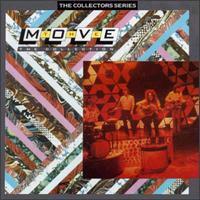
- Format: MP3

Since the late '80s, there's been a steady stream of Move compilations, reissues, and repackagings in response to renewed interest in the band. Like a number of those releases, The Collection focuses on the Move's 1967-1970 period, featuring the group's A-sides plus a few other album tracks. Listening to the singalong mod pop of "Flowers in the Rain" and the more riff-driven "I Can Hear the Grass Grow," you can hear the debt owed by subsequent generations of power pop acts, from Cheap Trick to the Posies to the Shazam. Ironically, however, while their bouncy, harmony-rich rock later found particular favor in the U.S., during the Move's lifetime their records went largely unnoticed stateside. The Move's early singles sound very much of their time; they stand as period pieces, albeit brilliant ones that display the ways in which Roy Wood's songwriting abilities set him apart from many of his contemporaries. Indeed, tracks like "Cherry Blossom Clinic Revisited," "Night of Fear," and "Blackberry Way" (the anti-"Penny Lane") attest to Wood's idiosyncratic, classically nuanced musical sensibility and his occasionally noir-ish lyrical vision. Although The Collection showcases the Birmingham band's more memorable, poppier moments, it also samples the Move's harder-edged tendencies: the proto-glam flamboyance of "Wild Tiger Woman," the '50s rock & roll licks of "Fire Brigade," and the chugging "Brontosaurus," which had much in common with the nascent heavy metal sounds emanating from Britain's industrial heartland at the time. The band's rock prowess can be best heard on four live songs culled from the 1968 Something Else EP. This is a solid compilation that traces the Move's changing sound, from tracks encapsulating their early psychedelic pop orientation to later numbers like "When Alice Comes Back to the Farm" that give a stronger indication of the direction Wood and Jeff Lynne would take with ELO.